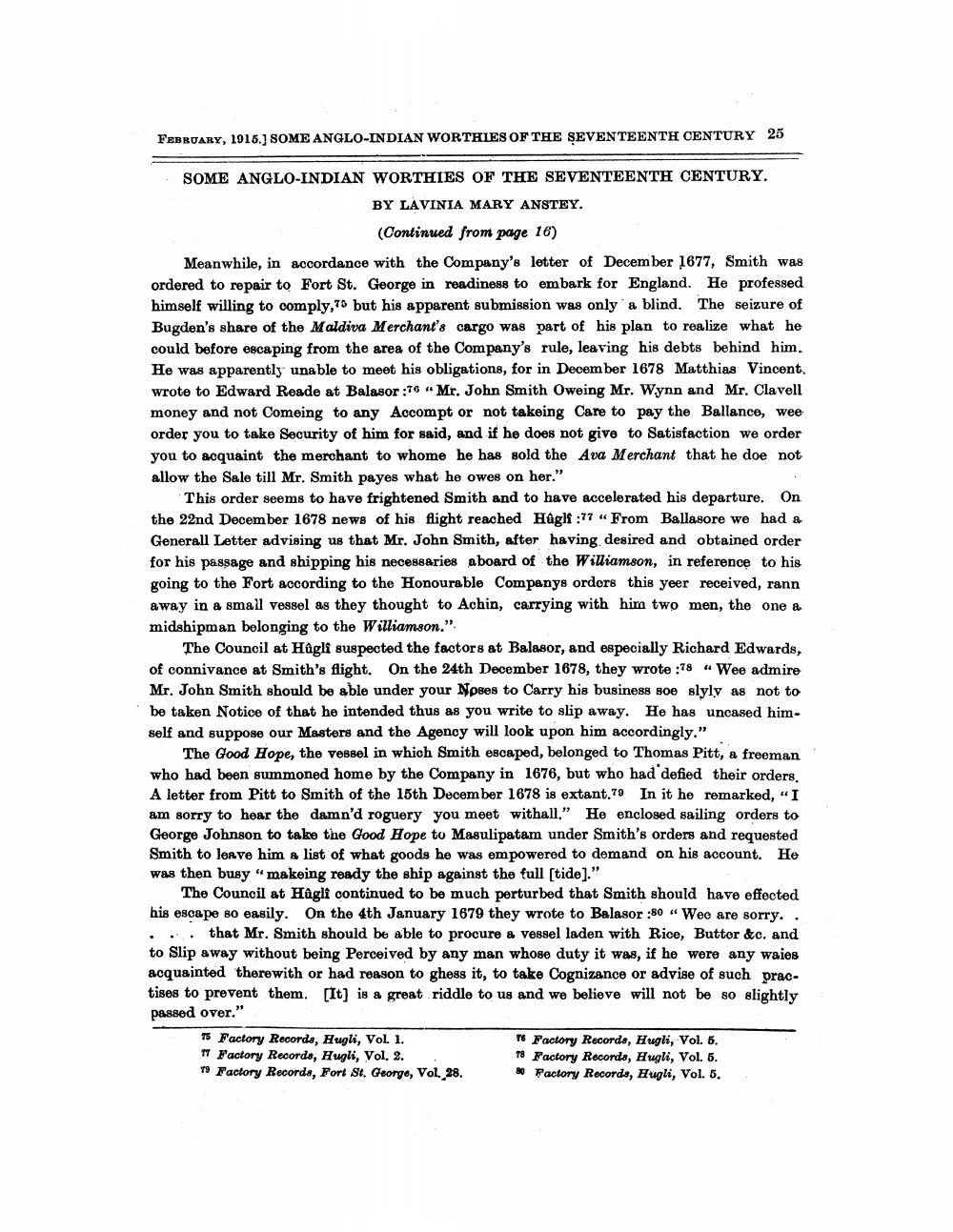________________
FEBRUARY, 1915.) SOME ANGLO-INDIAN WORTHIES OF THE SEVENTEENTH CENTURY 25
SOME ANGLO-INDIAN WORTHIES OF THE SEVENTEENTH CENTURY.
BY LAVINIA MARY ANSTEY.
(Continued from page 16) Meanwhile, in accordance with the Company's letter of December 1677, Smith was ordered to repair to Fort St. George in readiness to embark for England. He professed himself willing to comply, but his apparent submission was only a blind. The seizure of Bugden's share of the Maldiva Merchant's cargo was part of his plan to realize what he could before escaping from the area of the Company's rule, leaving his debts behind him. He was apparently unable to meet his obligations, for in December 1678 Matthias Vincent, wrote to Edward Reade at Balasor:76 "Mr. John Smith Oweing Mr. Wynn and Mr. Clavell money and not Comoing to any Accompt or not takeing Care to pay the Ballance, wee order you to take Security of him for said, and if he does not give to Satisfaction we order you to acquaint the merchant to whome he has sold the Ava Merchant that he doe not allow the Sale till Mr. Smith payes what he owes on her."
This order seems to have frightened Smith and to have accelerated his departure. On the 22nd December 1678 news of his flight reached Haglf:77 "From Ballasore we had a Generall Letter advising us that Mr. John Smith, after having desired and obtained order for his passage and shipping his necessaries aboard of the Williamson, in reference to his going to the Fort according to the Honourable Companys orders this yeer received, rann away in a small vessel as they thought to Achin, carrying with him two men, the one a midshipman belonging to the Williamson."
The Council at Hûgli suspected the factors at Balasor, and especially Richard Edwards, of connivance at Smith's flight. On the 24th December 1678, they wrote:78 “Wee admire Mr. John Smith should be able under your Noses to Carry his business soe slyly as not to be taken Notice of that he intended thus as you write to slip away. He has uncased him. self and suppose our Masters and the Agency will look upon him accordingly."
The Good Hope, the vessel in which Smith escaped, belonged to Thomas Pitt, a freeman who had been summoned home by the Company in 1676, but who had defied their orders A letter from Pitt to Smith of the 15th December 1678 is extant.79 In it he remarked, "I am sorry to hear the damn'd roguery you meet withall." He enclosed sailing orders to George Johnson to take the Good Hope to Masulipatam under Smith's orders and requested Smith to leave him a list of what goods he was empowered to demand on his account. He was then busy "makeing ready the ship against the full [tide]."
The Council at Hûgli continued to be much perturbed that Smith should have effected his escape so easily. On the 4th January 1679 they wrote to Balasor :80 "We are sorry.. ... that Mr. Smith should be able to procure a vessel laden with Rice, Buttor &c. and to Slip away without being Perceived by any man whose duty it was, if he were any waies acquainted there with or had reason to ghess it, to take Cognizance or advise of such practises to prevent them. [It) is a great riddle to us and we believe will not be so slightly passed over." 75 Factory Records, Hugli, VOL 1.
16 Factory Records, Hugli, Vol. 5. TT Factory Records, Hugli, Vol. 2.
78 Factory Records, Hugli, Vol. 5. 19 Factory Records, Fort St. George, Vol. 28. 20 Factory Records, Hugli, Vol. 5. .




